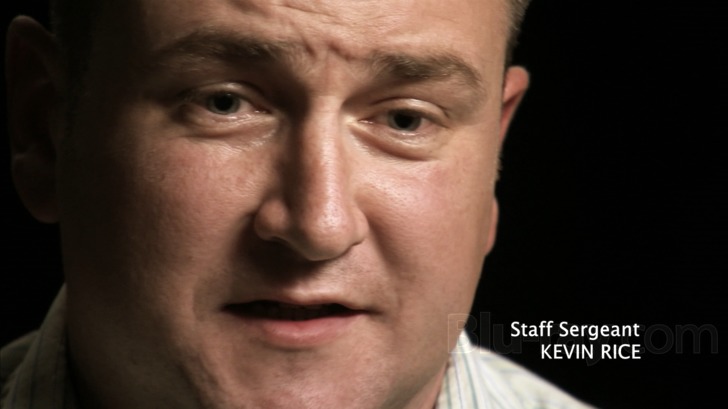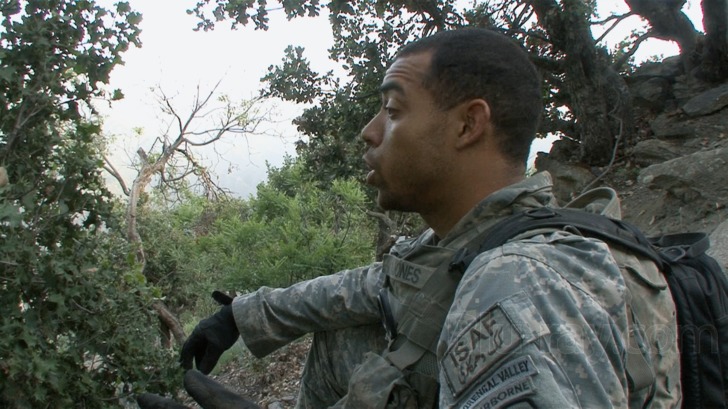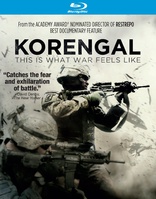Korengal Blu-ray Movie
HomeKorengal Blu-ray Movie 
Virgil Films & Entertainment | 2014 | 85 min | Rated R | Sep 09, 2014Movie rating
7 | / 10 |
Blu-ray rating
| Users | 0.0 | |
| Reviewer | 4.0 | |
| Overall | 4.0 |
Overview
Korengal (2014)
Korengal picks up where Restrepo left off; the same men, the same valley, the same commanders, but a very different look at the experience of war.
Starring: Miguel Cortez, Dan Kearney, Sterling Jones (III), Brendan O'Byrne, Misha Pemble-BelkinDirector: Sebastian Junger
| War | Uncertain |
| Documentary | Uncertain |
| History | Uncertain |
Specifications
Video
Video codec: MPEG-4 AVC
Video resolution: 1080p
Aspect ratio: 1.78:1
Original aspect ratio: 1.78:1
Audio
English: DTS-HD Master Audio 5.1 (48kHz, 24-bit)
English: DTS-HD Master Audio 2.0 (48kHz, 24-bit)
Subtitles
English
Discs
25GB Blu-ray Disc
Single disc (1 BD)
Playback
Region A (B, C untested)
Review
Rating summary
| Movie | 4.5 | |
| Video | 4.0 | |
| Audio | 3.5 | |
| Extras | 3.5 | |
| Overall | 4.0 |
Korengal Blu-ray Movie Review
Restrepo Redux
Reviewed by Michael Reuben September 20, 2014Korengal is a sequel to the Oscar-nominated 2010 documentary Restrepo by war correspondents Sebastian Junger and Tim Hetherington. Restrepo was the product of over a year of living alongside the U.S. soldiers assigned to a remote outpost in Afghanistan, accompanying them on missions and sharing their hardships. The outpost was named after medic Juan Restrepo, a beloved member of the company who was one of the unit's first casualties. It was a rough encampment that had been arduously dug out of high ground in the Korengal Valley in eastern Afghanistan, which was the scene of some of the war's heaviest fighting and a key area for disrupting enemy supply lines. With no running water and zero amenities (except what could be flown in by helicopter), the outpost was positioned as bait. By drawing Taliban fire away from the nearby Pech District, it facilitated the building of schools, hospitals and other productive activities intended to benefit the civilian population. By combining documentary footage from the deployment with interviews taken immediately after the soldiers' tour had ended, Restrepo attempted to capture, as the two directors said at the time, "the experience of combat, boredom and fear through the eyes of the soldiers themselves. Their lives were our lives: we did not sit down with their families, we did not interview Afghans, we did not explore geopolitical debates. Soldiers are living and fighting and dying at remote outposts in Afghanistan in conditions that few Americans back home can imagine. Their experiences are important to understand, regardless of one's political beliefs." After the release of Restrepo in 2010, however, Junger believed there was more to say. By then, the U.S. military had abandoned its position in the Korengal Valley; Korengal opens with the destruction of Outpost Restrepo, so that nothing would be left for the enemy. Some of the soldiers who appeared in Restrepo left the Army and returned home, while others moved on to other deployments. Junger himself experienced an intense emotional, one might almost say spiritual, conversion, that led him to abandon war reporting after twenty years. He began analyzing the experience of war, not just in Afghanistan but in general, and began questioning whether the much-publicized difficulties of so many combat veterans in adjusting to civilian life could so easily be written off under the convenient label of "PTSD". Combing through the extensive footage unused in Restrepo, Junger saw the outlines of a new chapter in the story. Korengal suffered a setback when Junger's co-director and collaborator, Tim Hetherington, was killed in April 2011 while covering the civil war in Libya. Despite this personal and professional loss, Junger persevered. Hetherington's voice can still be heard off-camera in many interviews; his extensive involvement remains an essential part of the film; and his picture is the last to appear after the final credits.

The extras provided with the Blu-ray of Korengal serve as a kind of "Cliffs Notes" guide to Junger's thesis in the film, but the points emerge more powerfully from the mosaic of soldiers' reflections assembled by editor Michael Levine (an Emmy winner for Restrepo). Where Restrepo contained many scenes of combat, Korengal focuses most intensely on the relationships among the soldiers in the outpost, especially during their downtime. Junger, who studied anthropology before becoming a reporter, wants to study the nature of the connection that develops among young men living in close quarters under the constant threat of violent death. As Junger repeatedly notes in his disc commentary, this type of relationship is nothing new, just as war is nothing new. He calls it "brotherhood", because war has historically been a pursuit, and even a rite of passage, for young men, and because the combat troops assigned to missions like Outpost Restrepo remain overwhelmingly male. He also wants to distinguish the connection among these soldiers from "friendship", because it's an entirely different mode of relating. Many of these men don't even like each other, but the issue is irrelevant. This point is made with particular force during a remarkable interview at the outpost with Sterling Jones, the sole African-American non-officer in the platoon, who, according to Junger, took a long time to open up on camera. When he does, he says that "95%" of the ribbing he gets for being black isn't serious (which means that 5% of it is) and that some of his fellow soldiers at the outpost dislike him because of his race—but none of them would hesitate to take him into a firefight. This dichotomy between liking someone and trusting him with your life is central to Korengal and to the special bond between soldiers that fascinates Junger. The former is all about what's good for me; the latter is based on what's good for the group, and it creates a sense of belonging that is virtually non-existent in civilian society. As Junger observes in the extras, and as the remarkable collection of interviews in the film demonstrates repeatedly, soldiers do not just get hooked on the adrenalin rush of combat (although that certainly happens). They become accustomed to living with fellow soldiers in whom they know they can place absolute trust at all times. Then, when their service ends, they find themselves suddenly thrust into a life in which no one, not even family, friends and significant others, understands that level of trust and self-sacrifice. Small wonder that so many returning veterans experience depression, sadness and a sense of not fitting in. As Junger pointedly asks in the disc's extras, is that entirely their problem or is it at least partly ours, which the vets are now seeing for the first time because their war experience has altered their perspective? These are the kinds of questions with which Junger was left when he completed Korengal. The film itself belongs to the voices of the soldiers, whose specific experiences within this band of brothers remain a product of individual character. Several speak frankly of taking great satisfaction in killing an enemy combatant because, among other things, that's someone who won't be trying to kill them or any of their comrades in the future, while one soldier, who says he wasn't especially religious before he joined the Army, struggles with a sense that his actions are unforgivable in the eyes of God. One member of the company recounts how, when he first arrived in Afghanistan, he was so certain he would die that he behaved with suicidal indifference to his safety, until one day members of the platoon pulled him aside and pointed out that his conduct wasn't just a danger to himself but to everyone around him—and he immediately changed his ways. Later in the film, the same soldier is shown receiving a medal for bravery. Many of the interviewees talk about the need to put one's emotions aside and get on with the job, but when Junger asks one of them to talk about Juan Restrepo, for whom the base was named, the soldier chokes up and cannot do so. Whatever the subject, however, the soldiers who speak in Korengal address the camera with a directness and a lack of agenda that is so strikingly at odds with typical discussions of the war in Afghanistan that one can easily understand Junger's interest in the larger questions raised by their experience. Some of those questions will presumably be explored in the film that Junger undertook with several veterans of the Korengal campaign, The Last Patrol, to be released later this year.
Korengal Blu-ray Movie, Video Quality 

Unlike its predecessor, Restrepo, which was encoded on Blu- ray at 1080i with MPEG-2, Korengal benefits from a 1080p, AVC-encoded presentation by Virgil Films, but the documentary's video quality is still limited by its source material. For all of the scenes and interviews shot on location at Outpost Restrepo and in the Korengal Valley, filming was handheld and limited to available light, and the image is sometimes unavoidably distorted and noisy beyond any ability of post-production manipulation to clean it up. The weakest moments are those taken directly from GoPro cameras in the helmets of soldiers on maneuvers, plus a few short clips of video obtained from the Taliban, which are blurry but chilling, because they show an assault on an American outpost from the enemy's perspective. The interviews taken after the deployment are sharp, clear and well-framed, with solid black backgrounds and professional lighting; it's here that the Blu-ray's true quality can be seen most clearly. Source material with imperfections is often more difficult to reproduce accurately than footage that's crystal clear, and Virgil Films has mastered the 85-minute Korengal with a relatively high bitrate of 27.91 Mbps, which is certainly sufficient to avoid adding to the challenges of the material with compression issues.
Korengal Blu-ray Movie, Audio Quality 

The lossy audio included with Restrepo was effective at conveying the fury of battle, but Korengal has few battle scenes to challenge its two lossless audio tracks, a 5.1 and a 2.0, both in DTS-HD MA. A few short scenes of the base defending itself against attack are outdone by a segment in which interviewees discuss which weapon is their favorite (with appropriate scenes capturing the sound of each). A nearby detonation during maneuvers strikes with intense force, but the point of the scene is to show how experienced soldiers don't react to anything that isn't an immediate threat. The voices of the interviewees are always clear, as are those not being interviewed but simply interacting at the base (including the full range of profanity, for those with small children in the house). Marty Beller of the band They Might Be Giants wrote the effective score.
Korengal Blu-ray Movie, Special Features and Extras 

- Commentary by Director Sebastian Junger: The commentary is listed as a soundtrack option under "Setup". Junger provides essential information about his own history, describes the arduous process of gathering the material that provided the basis for both Restrepo and Korengal and gives his perspective on the completed film and its themes. He also talks about the third film in the trilogy, The Last Patrol, which was shot in America and which HBO will release later this year.
- TED Talk; Sebastian Junger: Why Veterans Miss War (1080p; 1.78:1; 13:08): TED (Technology, Entertainment, Design) is a not-for-profit organization devoted to spreading ideas through publications, speeches, webcasts and other formats. Junger gave this talk to an audience in January 2014. It's an excellent summary of many of the themes explored in Korengal.
- Trailer (1080p; 1.78:1; 1:36): "Same Valley. Same Soldiers. New Journey."
Korengal Blu-ray Movie, Overall Score and Recommendation 

When I reviewed Restrepo for another site, I opined that it would be essential material for future historians of the war in Afghanistan. Korengal adds to that record, but its focus puts this film closer to the fictional depictions that have portrayed how war transforms individuals: works like The Hurt Locker, Platoon, La Grande Illusion or The Big Parade (to remain strictly in cinema; the literary canon would be enormous). The fact that Korengal is a documentary rather than a work of fiction makes it somewhat less focused and neatly organized, because facts never lay themselves out as precisely as a script, but Junger's film also has an authenticity that no fictional work could ever claim. Virgil Films' Blu-ray presentation is technically proficient and highly recommended.
Similar titles
Similar titles you might also like

The Vietnam War
2017

Restrepo
2010

The War
2007

They Shall Not Grow Old
2018

Vietnam in HD
2011

WWII in HD
World War II in HD
2009

The World at War
1973

The World Wars
2014

Ken Burns: The Civil War
1990

Last Days in Vietnam
American Experience: Last Days in Vietnam
2014

Gettysburg
2011

Cease Fire 3D
1953

Victory at Sea
Deluxe Edition
1952-1953

D-Day: Normandy 1944 4K
75th Anniversary Edition
2014

Apocalypse: World War II
2010

WWII From Space
2012

The Hornet's Nest
2014

The Cold Blue
2018

Ultimate Civil War
150th Anniversary Edition
2012

Hearts and Minds
1974
